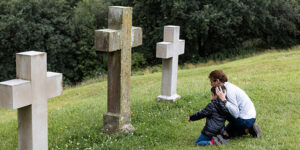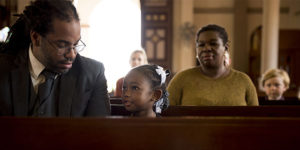A previous Growing Faith article looked at the value of having pets as part of our family. But the inevitable downside of loving pets is the heartbreak of losing them. When this happens, our children may wonder, ‘Will my pet be in heaven?’. Here are some things to keep in mind as we answer.
The question behind the question
To begin with, it’s helpful to consider that our children may not be looking for a detailed theological answer to this question. It may simply be an expression of how much they miss their pet and wish they could see them again.
Before jumping to a theological answer, it’s always good to stop and acknowledge our child’s feelings. We can say something like, ‘I know you really miss Daisy. I do too. The hard part of loving someone is having to say goodbye to them. It’s normal to feel sad when someone you care about dies.’
Explaining heaven
When we do go on to explain heaven, it’s important not to speculate beyond what the Bible says. Unfortunately, heaven is one of those topics where we often desire more detail and certainty than the Bible provides. Perhaps that’s why there are so many commonly held ideas about heaven that are derived more from popular culture or classical art than from the Bible.
In the Bible, ‘the heavens’ can simply refer to the skies above us, but it also refers to the place where God dwells. God’s Old Testament people were to pray: ‘Look down from heaven, your holy dwelling place, and bless your people Israel’ (Deuteronomy 26:15). Jesus also taught us to pray to ‘Our father in heaven’ (Matthew 6:9). I like to explain this to my children as being not just ‘above’ the earth, but also ‘behind’ what we can see with our eyes. Heaven is in another, spiritual dimension that is currently invisible to us.
We can explain to our children that people who trust in Jesus will go to be with him when they die (Philippians 1:23). But a day is coming when Jesus will return, those who have died will rise again, and all people will be judged (1 Thessalonians 4:16–18). Peter explains further:
‘That day will bring about the destruction of the heavens by fire, and the elements will melt in the heat. But in keeping with his promise we are looking forward to a new heaven and a new earth, where righteousness dwells.’ (2 Peter 3:12–13)
We can comfort our children with the famous words of Revelation 21:
‘Then I saw “a new heaven and a new earth”, for the first heaven and the first earth had passed away, and there was no longer any sea. I saw the Holy City, the new Jerusalem, coming down out of heaven from God, prepared as a bride beautifully dressed for her husband. And I heard a loud voice from the throne saying, “Look! God’s dwelling-place is now among the people, and he will dwell with them. They will be his people, and God himself will be with them and be their God. ‘He will wipe every tear from their eyes. There will be no more death’ or mourning or crying or pain, for the old order of things has passed away.”’ (Revelation 21:1–4)
We can reassure our children that, although we don’t know exactly what the ‘new heaven and new earth’ will be like, we won’t experience grief or sadness as we do now. Revelation describes heaven as full of people worshipping God, the one who sits on the throne in the heavenly city. When we get to heaven, we will be fully satisfied with the joy of seeing and worshipping our Lord.
Will animals be in heaven?
Keep reading over at Growing Faith, a Christian online magazine for parents. Find out more about Growing Faith and subscribe to our monthly e-newsletter here.


